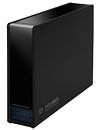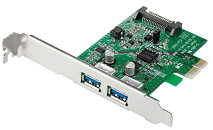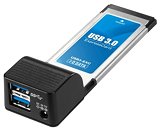Thursday, November 5th 2009
I-O Data Releases USB 3.0 HDDs, Addon Cards
I-O Data released a trio of products circled around the new USB 3.0 SuperSpeed standard. The first being the HDJ-UT external hard drive that supports USB 3.0, and then expansion cards that provide USB 3.0 support to PCs, desktops and notebooks alike: the USB3-PEX PCI-Express x1 two port low-profile addon card, and USB3-EXC ExpressCard 34 card. The HDJ-UT comes in capacities of 1 TB and 1.5 TB, and is backwards compatible with USB 2.0 systems. When connected using USB 3.0, it offers read speeds of up to 139 MB/s. The HDJ-UT external HDD is priced at US $231 (1 TB) and $279 (1.5 TB), while the USB3-PEX and USB3-EXC are priced at $69 and $93, respectively.
Source:
TechConnect Magazine



18 Comments on I-O Data Releases USB 3.0 HDDs, Addon Cards
Though just having some extra ports never hurt anybody.
An expresscard version that's extremely bulky, converting USB3.0 (~3.2Gbps) over express card (2.5Gbps)...
or,
A pcie x1 version that only has two ports despite being full height, and converts USB3.0(~3.2Gbps) to PCIe 1.0 X1 (2Gbps)
Expresscard 2.0 will have native usb3.0 support. By the time any usb3.0 flash drives are a decent price, we'll have expresscard 2.0 anyway.
The desktop card is useless unless they decide to move up to 4 ports and pcie 2.0 x1 or pcie 1.0 x4.
USB 3.0 is 300MB/s (approx, based on 10x USB 2.0 speeds)
one point would be, is that whats the odds on you using two USB 3.0 devices full speed simultaneously? i rarely use more than one USB storage device at a time (and very, VERY rarely copy from one USB device to another)
if its PCI-E 2.0, its not a problem, and can sustain high speeds to both ports.
(and its 250MB/s for PCI-E 1.1, lower than the 300MB/s of USB 3.0)
even with that halved, 125MB/s still shits all over USB 2.0's 30MB/s
EDIT: raid 0 nas... perhaps... but thats what ESATA is for i guess ;)
edit: i just realised, that PCI-E 1x card uses a SATA power plug at the rear of it :S
Or can a PCIE x1 card not still pull the full 75w from the slot?
Can't find what current a PCI-E (or x1 slot, if there is a difference from x16) slot provides. My 4670 for example though runs entirely off the slot, surely it has to be able to provide more than what that draws :wtf:
if so wouldnt a PCI-E or ESATA based port be better for HDD/SDD's?
I guess if not being used for hardrives you could stream HD video through USB3 perhaps... other than that I cant really see the point of it needing that sort of speed
I feel this will be great in 2012. Untill then, they should have made 2.0 a bit faster and called it good for the time being.